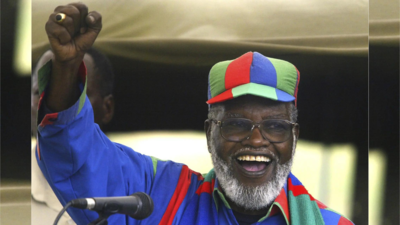Sam Nujoma, Namibia’s first president and the leader who guided the country to independence from apartheid South Africa in 1990, died on Saturday at the age of 95.
His death was announced by Namibia’s current president Nangolo Mbumba on Sunday. He said that Nujoma passed away in a hospital in Windhoek after being ill for three weeks, New York Times reported.
Nujoma was a key figure in Namibia’s liberation struggle, heading the South West Africa People’s Organization (SWAPO) since its formation in 1960. He led a Soviet-backed guerrilla army in a protracted war against South Africa, which had occupied Namibia despite international condemnation.
While Nujoma himself did not participate directly in combat, he was the face of the resistance, balancing diplomacy with armed struggle.
Independence was ultimately achieved through a US-brokered agreement, which saw South Africa withdraw from Namibia in exchange for the removal of Cuban troops from Angola, accordng to the New York Times. Despite being excluded from negotiations, Nujoma became Namibia’s first president and remained in power for 15 years, securing a constitutional amendment to run for a third term in 1999.
His leadership helped bring national reconciliation and economic stability to Namibia, with even political opponents acknowledging his role in uniting a deeply divided nation, as per the news agency AP.
However, Nujoma was also known for his autocratic tendencies, anti-Western rhetoric, and controversial stances, including his support for Zimbabwe’s Robert Mugabe and his harsh anti-homosexuality remarks. In 2001, he warned that gays and lesbians would be arrested, jailed, or deported.
Despite his fiery leadership style, Nujoma remained a revered figure in Namibia. His image appears on national currency, and a six-meter-tall statue stands outside the Namibian Independence Museum. Even after retirement, he remained politically vocal, calling for renegotiation of Germany’s compensation for its colonial-era genocide of the Herero and Nama peoples, as per AFP.
A symbol of Africa’s independence era, Nujoma’s legacy places him among figures like Nelson Mandela, Kenneth Kaunda, and Samora Machel.







